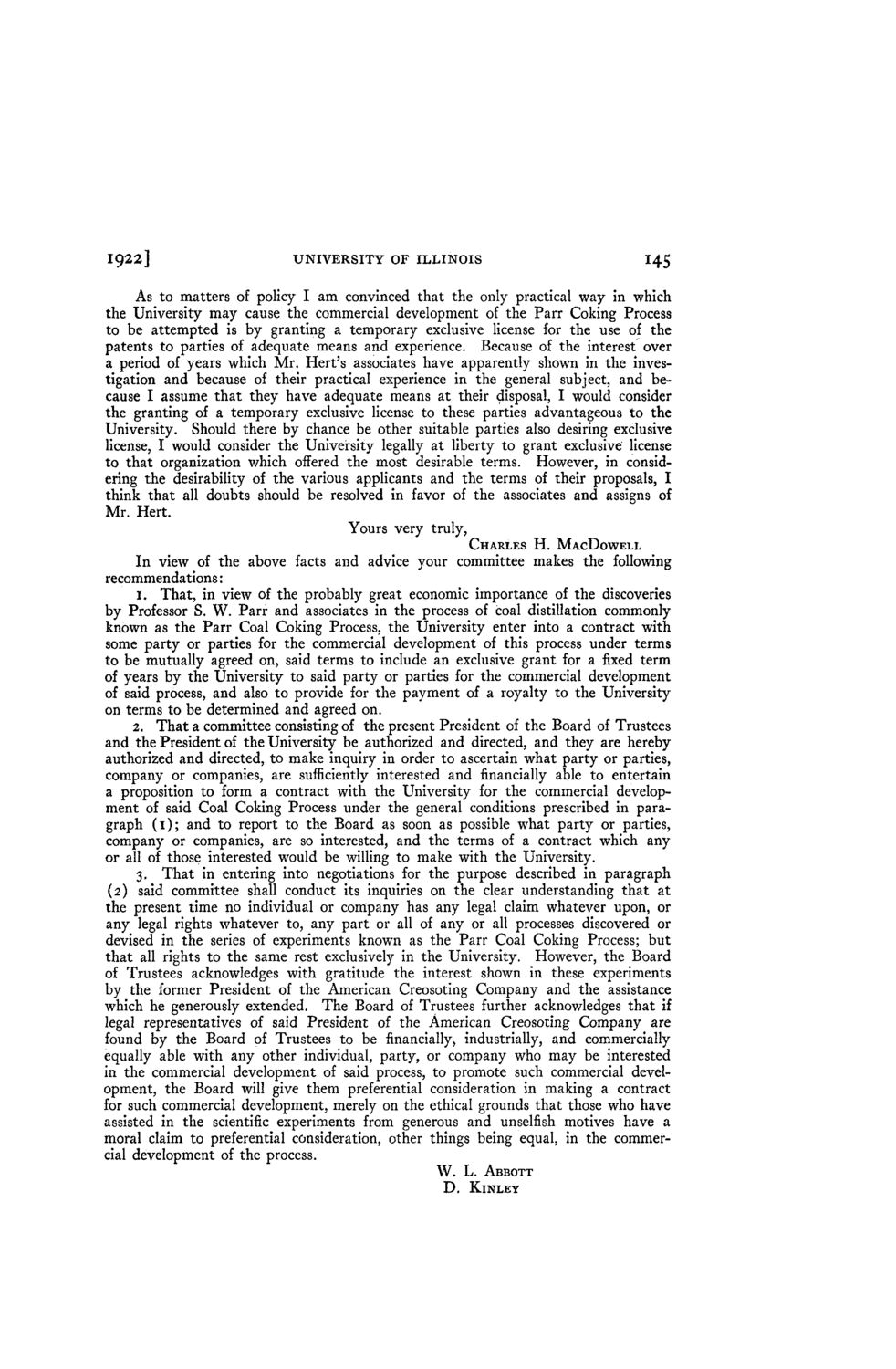| |
| |
Caption: Board of Trustees Minutes - 1922
This is a reduced-resolution page image for fast online browsing.

EXTRACTED TEXT FROM PAGE:
1922] UNIVERSITY OF ILLINOIS I4S As to matters of policy I am convinced that the only practical way in which the University may cause the commercial development of the Parr Coking Process to be attempted is by granting a temporary exclusive license for the use of the patents to parties of adequate means and experience. Because of the interest over a period of years which Mr. Hert's associates have apparently shown in the investigation and because of their practical experience in the general subject, and because I assume that they have adequate means at their disposal, I would consider the granting of a temporary exclusive license to these parties advantageous to the University. Should there by chance be other suitable parties also desiring exclusive license, I would consider the University legally at liberty to grant exclusive license to that organization which offered the most desirable terms. However, in considering the desirability of the various applicants and the terms of their proposals, I think that all doubts should be resolved in favor of the associates and assigns of Mr. Hert. Yours very truly, CHARLES H. MACDOWELL In view of the above facts and advice your committee makes the following recommendations: 1. That, in view of the probably great economic importance of the discoveries by Professor S. W. Parr and associates in the process of coal distillation commonly known as the Parr Coal Coking Process, the University enter into a contract with some party or parties for the commercial development of this process under terms to be mutually agreed on, said terms to include an exclusive grant for a fixed term of years by the University to said party or parties for the commercial development of said process, and also to provide for the payment of a royalty to the University on terms to be determined and agreed on. 2. That a committee consisting of the present President of the Board of Trustees and the President of the University be authorized and directed, and they are hereby authorized and directed, to make inquiry in order to ascertain what party or parties, company or companies, are sufficiently interested and financially able to entertain a proposition to form a contract with the University for the commercial development of said Coal Coking Process under the general conditions prescribed in paragraph (1); and to report to the Board as soon as possible what party or parties, company or companies, are so interested, and the terms of a contract which any or all of those interested would be willing to make with the University. 3. That in entering into negotiations for the purpose described in paragraph (2) said committee shall conduct its inquiries on the clear understanding that at the present time no individual or company has any legal claim whatever upon, or any legal rights whatever to, any part or all of any or all processes discovered or devised in the series of experiments known as the Parr Coal Coking Process; but that all rights to the same rest exclusively in the University. However, the Board of Trustees acknowledges with gratitude the interest shown in these experiments by the former President of the American Creosoting Company and the assistance which he generously extended. The Board of Trustees further acknowledges that if legal representatives of said President of the American Creosoting Company are found by the Board of Trustees to be financially, industrially, and commercially equally able with any other individual, party, or company who may be interested in the commercial development of said process, to promote such commercial development, the Board will give them preferential consideration in making a contract for such commercial development, merely on the ethical grounds that those who have assisted in the scientific experiments from generous and unselfish motives have a moral claim to preferential consideration, other things being equal, in the commercial development of the process. W. L. ABBOTT D. KINLEY
| |